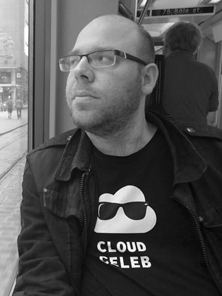 By Ofer Prossner, VP, Operations, IOD
By Ofer Prossner, VP, Operations, IOD
Hi. My name is Ofer, and I might still be a journalist.
I guess that statement requires some explanation. Here’s the background: In college, I studied film and TV with a focus in script writing, and by a stroke of luck and a dose of Israeli chutzpah, I got into journalism. (Okay, so if you want to know the details, someone wrote an op-ed about my favorite sports team and I wrote an – ahem – “highly opinionated” talkback in response. The editor of the paper contacted me and asked me if I wanted to write for them.)
The money in print journalism wasn’t that good when I got there (if it was ever good). To top things off, the newspaper group I worked for was constantly shaking things up, reinventing formats and coming up with plans for how to stop the inevitable fate of print news becoming obsolete as online news consumption became more widespread.
From Print to Online
When I decided to leave the print publication to go work for a website, I thought I was beating the system. Six months later, though, I was fired. Cuts. Always cuts.
I spent a few weeks feeling sorry for myself, asking myself again and again why I do what I do. The answer was always the same—I love telling stories. I am a gregarious raconteur, always ready with a juicy or funny tale. I didn’t want to move on to another profession; I wanted to keep telling stories. But how? Where?
I dove deep into freelance content writing, knowing that this was the way to keep doing what I loved and get paid for it. Website content, sports reviews, blogs — if it had words, I’d write it. If it involved editing, I edited.
I learned a lot over this period of time, but one lesson had a significant impact — lots of other former journalists had turned to content writing, and so supply was high. But even though demand for content was also high, online media publications were scrambling for ways to make a profit. One way was to pay writers lower and lower rates.
Story-Telling Can Become A Career
Jumping a few years into the future, I am no longer an active journalist, but I still consider myself a story-teller. (And luckily my job at IOD allows me the opportunity to do so every now and again.) I still have many journalist friends, though, and it seems that every other month, at least one of them comes and asks me for advice about breaking away from the industry.
I always ask my friends the same thing: what do you want to do next? If the answer is “I still want to write,” then I remind them that they have an advantage over many other job seekers. Knowing how to find the story and then tell it in a meaningful way to others is a valuable skill.
You see, whatever you do—tech and IT included—the ability to write about your chosen field or expertise will serve you well, and smart employers recognize this. If you know how to turn complex information into an easy read, you are a strong asset to any organization.
So, I advise my friends to see what’s missing in the area of online content. Learn about that topic and start a blog (an instagram and twitter account don’t hurt either). Or, perhaps you already have an unusual skill or talent you can start writing about right now. Show potential employers that you not only have the knowledge, but that you can use your talent for writing to educate others.
Tech Content Is High In Demand
At IOD, we are always on the lookout for such individuals — for us the focus is obviously on IT. But IOD isn’t alone in its pursuit of gifted writers—I talk with marketing executives constantly, and many of them are looking for competent in-house writers, as well.
So, dear journalists, whatever you choose to do with your professional life, don’t stop writing about it. It will help bring you more customers, value, and maybe even opportunities that you never would have expected.

